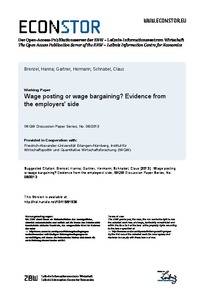Wage posting or wage bargaining? Evidence from the employers' side
"Using a representative establishment dataset, this paper is the first to analyze the incidence of wage posting and wage bargaining in the matching process from the employer's side. We show that both modes of wage determination coexist in the German labor market, with about two-thirds of h...
| Main Authors: | , , |
|---|---|
| Institution: | ETUI-European Trade Union Institute |
| Format: | TEXT |
| Language: | English |
| Published: |
Erlangen
2013
IWQW |
| Subjects: | |
| Online Access: | https://www.labourline.org/KENTIKA-19124160124919423429-Wage-posting-or-wage-bargainin.htm |
| _version_ | 1771659895106437120 |
|---|---|
| author | Brenzel, Hanna Gartner, Hermann Schnabel, Claus |
| author_facet | Brenzel, Hanna Gartner, Hermann Schnabel, Claus |
| collection | Library items |
| description | "Using a representative establishment dataset, this paper is the first to analyze the incidence of wage posting and wage bargaining in the matching process from the employer's side. We show that both modes of wage determination coexist in the German labor market, with about two-thirds of hirings being characterized by wage posting. Wage posting dominates in the public sector, in larger firms, in firms covered by collective agreements, and in part-time and fixed-term contracts. Job-seekers who are unemployed, out of the labor force or just finished their apprenticeship are also less likely to get a chance of negotiating. Wage bargaining is more likely for more-educated applicants and in jobs with special requirements as well as in tight regional labor markets. -- Dieser Aufsatz analysiert erstmals mit Hilfe einer repräsentativen Betriebsbefragung die Verbreitung von fixen Lohnangeboten der Arbeitgeber und von Lohnverhandlungen bei Neueinstellungen. Wir zeigen, dass sowohl individuelle Lohnverhandlungen als auch fixe Lohnangebote in Deutschland vorkommen, wobei bei rund zwei Drittel der Neueinstellungen ein fixer Lohn angeboten wird. Besonders häufig gibt es fixe Lohnangebote im öffentlichen Dienst, in tarifgebundenen Firmen und bei Teilzeit- oder befristeter Beschäftigung. Mit Personen, die vorher nicht erwerbstätig waren oder eine Ausbildung beendet haben, wird seltener über den Lohn verhandelt. Wahrscheinlicher ist eine Lohnverhandlung, wenn die eingestellte Person höher qualifiziert ist, wenn spezielle Qualifikationen verlangt werden oder wenn die regionale Arbeitslosigkeit gering ist." |
| format | TEXT |
| geographic | Germany |
| id | 19124160124919423429_0493d0454be4426f9b2f05738d8886ed |
| institution | ETUI-European Trade Union Institute |
| is_hierarchy_id | 19124160124919423429_0493d0454be4426f9b2f05738d8886ed |
| is_hierarchy_title | Wage posting or wage bargaining? Evidence from the employers' side |
| language | English |
| physical | 24 p. Digital |
| publishDate | 2013 |
| publisher | Erlangen IWQW |
| spellingShingle | Brenzel, Hanna Gartner, Hermann Schnabel, Claus collective bargaining recruitment wage determination employers role Wage posting or wage bargaining? Evidence from the employers' side |
| thumbnail | https://www.labourline.org/Image_prev.jpg?Archive=100112492839 |
| title | Wage posting or wage bargaining? Evidence from the employers' side |
| topic | collective bargaining recruitment wage determination employers role |
| url | https://www.labourline.org/KENTIKA-19124160124919423429-Wage-posting-or-wage-bargainin.htm |

